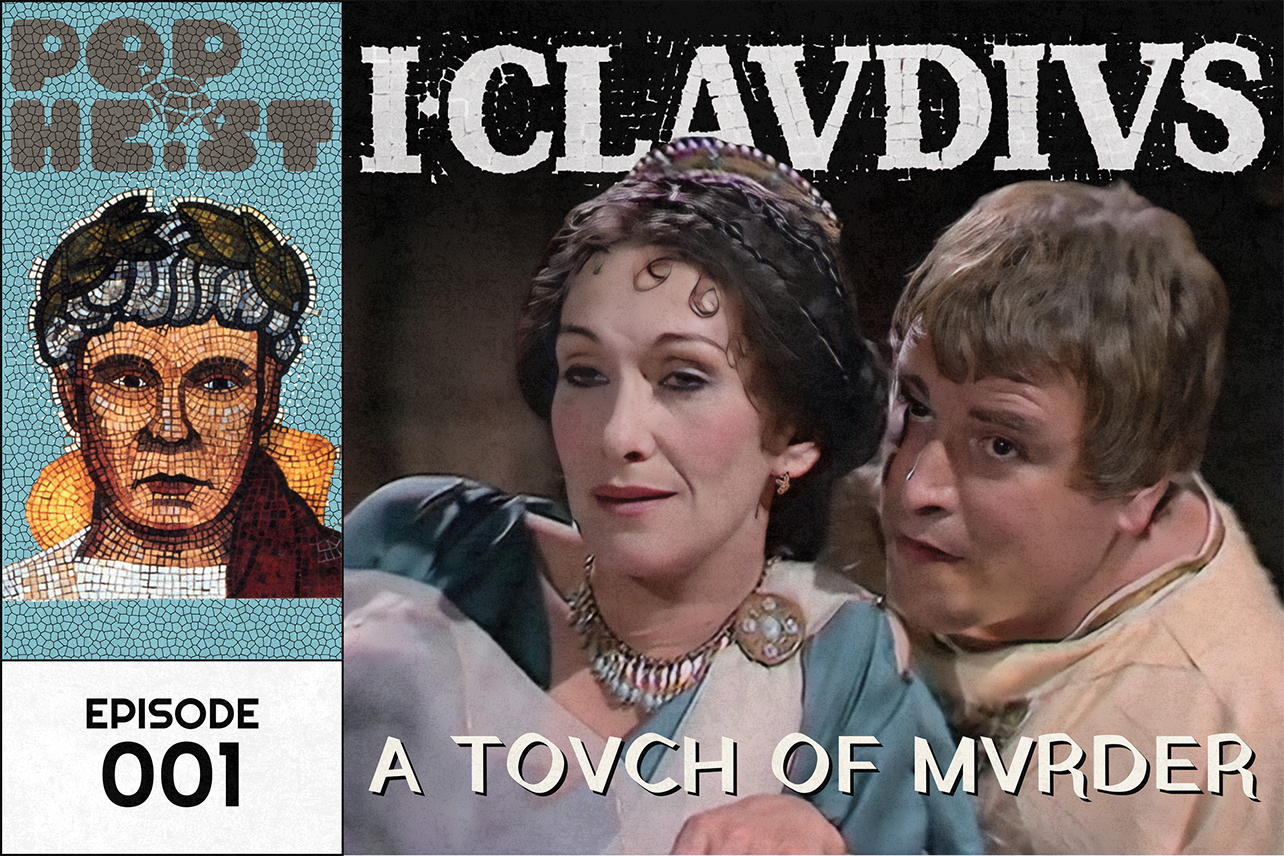In PRESTIGE PREHISTORY, Pop Heist critic Sean T. Collins takes a look at classic TV shows that paved the way for the New Golden Age of Television — challenging, self-contained series from writers and filmmakers determined to push the medium forward by telling stories their own way.
I, Claudius Episode 1
"A Touch of Murder"
Original Airdate: Sep. 20, 1976
Writer: Herbert Wise (based on the novels I, Claudius and Claudius the God by Robert Graves)
Director: Jack Pulman
Cast: Derek Jacobi, Siân Phillips, Brian Blessed, John Paul, Christopher Guard, George Baker, Frances White
I, Claudius feels weighty. A cast consisting almost solely of British acting royalty. A story about the mighty Roman Empire and the legendary (or infamous) men and women whose strength and cunning held it together (or tore it apart). Dialogue with a knack for sounding both casually naturalistic and as precisely calibrated as the finest poetry. A profound influence on such New Golden Age/Peak TV giants as David Chase and George R.R. Martin. Its legacy as a staple of the highfalutin line-up of PBS, back when our own empire believed in improving its subjects' lives somewhat. How do you wrap your mind around a show with a reputation this sterling and imposing? How do you wrestle this masterpiece to the ground?
You do it in a pit of mud, that's how. Sexy, sudsy, sinister, spearheaded by a cast that makes an absolute feast out of every betrayal and bon mot, I, Claudius is aimed at the gut and the groin as much as it's aimed at the noggin.
In this it has fine company. From the plays of William Shakespeare to the muddy streets of David Milch's Deadwood, great dramatists have long trafficked in this show's exact blend of intellect and intrigue — the professorial potboiler, if you will. Working from the novels I, Claudius and Claudius the God by the acclaimed British Lost Generation writer of poetry and prose Robert Graves, screenwriter Jack Pulman makes all his characters feel both convincingly remote and relatably and/or repulsively human.
The show is also aided by the manner in which it was…well, filmed would be misleading, as I, Claudius was shot on glorious, gloopy, murky, blurry, beautiful video. Moreover, there are no exteriors, no location shoots, nothing but a series of visibly artificial sets on BBC soundstages. Neither the camera nor the places and things it captures are intended to convince you this is the real world.
In other words, there's no lush cinematography or scenery for anyone on this show to hide behind. This thing will sink or swim the way a theatrical play does: by the ability of the actors to transport you to a place you can see with your own eyes isn't real, and to make you believe you're there anyway. As the anonymous author of this blog post put it, "If film drama is a director's medium, then tape drama is an actor's one." That's certainly true of I, Claudius, in which the acting is the only real special effect.
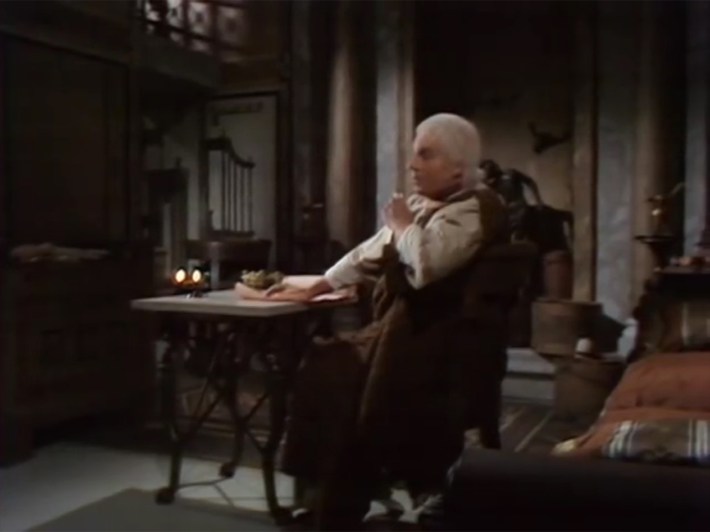
It begins and ends, literally, with the title character. A framing sequence introduces us to the story's unlikely hero as an old man, played by Derek Jacobi under an inch of age makeup. Though he has a whole string of names, he also emphasizes the cruel nicknames even his family and friends used to call him: "Claudius the Idiot, or That Fool Claudius, or Claudius the Stammerer." His current status in life is unclear, but he appears diminished from past heights, physically if nothing else. He's paranoid, fearful of spies and assassins. He speaks to a "you" only he can see (though before long we'll be able to guess at her identity).
And he's driven by prophecy. Some years earlier, he visited a masked sibyl (Freda Dowie) in her skull-lined cavern.
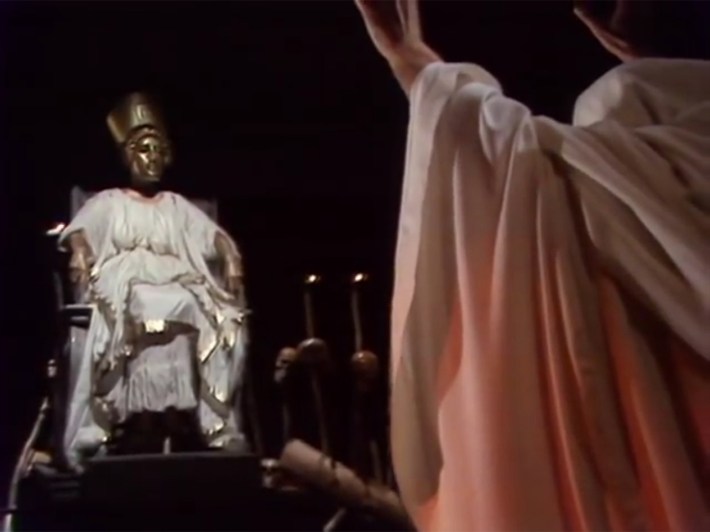
The seer foretold that after 1,900 years, the stuttering man's story would at last be heard. The time has come for him to get it down on paper, then hide it away for that far-off generation to discover and learn the strange and terrible truth about Claudius and his family, the Emperors of Rome.
But his voiceover narration indicates that the story he's writing down begins before his birth, seven years after the victory of Augustus (Brian Blessed), the first Emperor, over the combined forces of Marc Antony and Cleopatra at the Battle of Actium. The win helped put him on the throne and solidified the transformation of Rome from a republic to an empire.
Now Augustus is holding a gala celebration in the event's honor, involving a chatty, catty Greek orator, an unwelcome group of acrobats, a cake in the shape of his general's flagship, and a troupe of topless dancers doing a routine of dubiously African origin.
Lounging on couches and nibbling on snacks as per Roman custom, Augustus Caesar and his court are divided on the festivities. Marcellus (Christopher Guard), Augustus' doted-on nephew and adopted son, is loudly and obnoxiously skeptical of the battle's noteworthiness. Having studied the matter at length, he announces, he feels its outcome was a foregone conclusion. Marcus Agrippa (John Paul), the aging but still formidable general and friend of Augustus who commanded his forces at the battle, is none to happy to hear this brash young asshole badmouth his greatest victory.
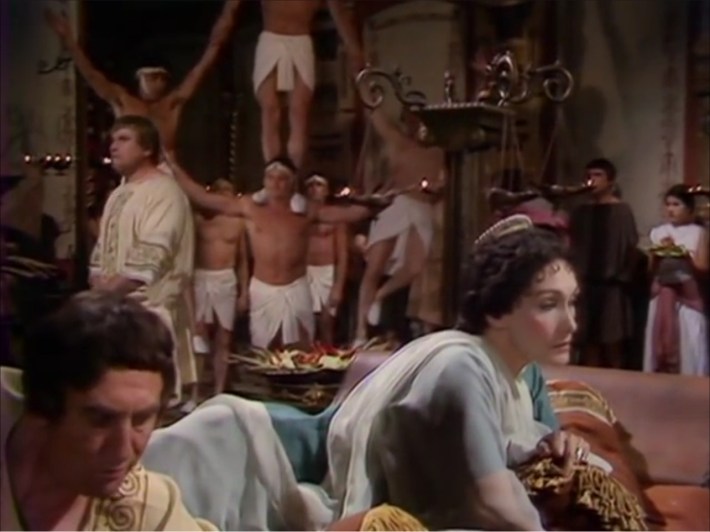
While the good-natured, people-pleasing Augustus seems oblivious to this strife in his upper echelons, his stunning, scheming wife, Livia (Siân Phillips), is picking up on every sneak diss and shady look. She's eager to maneuver Tiberius (George Baker), her meathead son by the husband she divorced in order to get on the Augustus bandwagon, into position as the next Caesar, and both Marcus and Marcellus are clearly higher in the line of succession. Gosh, it sure would be terrible if one of those guys marginalized himself while the other guy died, wouldn't it?
And hey, go figure, that's exactly what happens. Sick of playing second fiddle to the upstart Marcellus, Marcus ragequits the capital for the eastern province of Syria, telling Augustus that he'd be more good to the throne there than here. He only gets as far as the isle of Lesbos before abandoning the pretense altogether and leaving the governorship of Syria to an underling. Despite being all buddy-buddy in person, both Augustus and Marcus are aware of the politics the other man is playing.
As for Marcellus, the normally unflappable Livia seems actively frightened when she hears the roaring ovation the young city magistrate receives when he appears before the crowd at the Games he's arranged. When Marcellus catches a stomach bug while his wife, Julia (Frances White) — Augustus' daughter by his first wife, whom he divorced to get with Livia — is out of town, Livia senses her chance to strike. She takes over the young man's care personally and promptly poisons him to death.
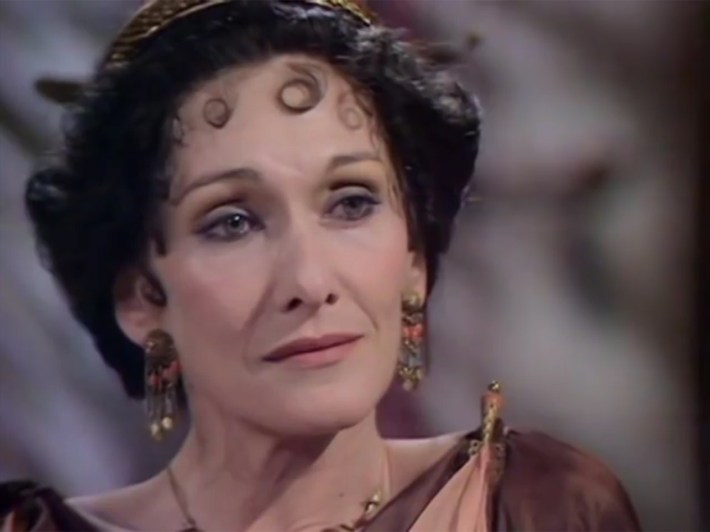
What's more, she all but crows about it in a series of double entendres for anyone with ears to hear. "I'm surprised you care whether he lives or dies," a surprised Tiberius exclaims when he learns his mother is nursing Marcellus personally. "I care very much whether he lives or dies," she says slyly.
After Marcellus succumbs, his doctor, Musa (Renu Setna), goes along with Livia's assessment that he died from food poisoning rather than a "summer chill." "I couldn't swear to it," he protests as he leaves, baffled and bereaved. "No," Livia murmurs as the man leaves, the ghost of a smile on her face, "but I could." This woman loves being evil, and I love that for her.
But being evil comes with its share of blowback. Though she's able to convince the higher-ups of the foodborne-illness theory, the hoi polloi are not so easily convinced. Riots break out in the streets throughout Rome in protest of the beloved Marcellus' suspicious death, and Livia herself gets pelted with a face full of shit when she steps outside the palace to hector the crowd. The whole thing appears like a big miscalculation by a woman who's not used to making them.
It gets so bad that Livia advises Augustus to go to Marcus Agrippa in his self-imposed exile and ask him to return to Rome, where his way with the common people could calm tensions. Sensing opportunity, Marcus agrees to help his old friend…on the condition that the newly widowed and much younger Julia marry him, bringing him into the royal family at last. Livia is, of course, livid to find out Augustus has made this deal. But what choice did her assassination of his son, which of course she keeps a secret, leave the oblivious monarch?
By the time we reach closing framing scene, in which the aged Claudius blames a bout of gas on poison by unseen agents, it's not hard to guess why he's so paranoid. Caesar's palace (sorry) is a hotbed, or a cesspool, of grudge-holding and favor-currying, in which not even family ties keep you from being bought and sold like a brood mare or put down like a troublesome dog if the need presents itself. That's no place for anyone to grow up, let alone a guy with a speech impediment. Not that you ever hear him stammer during his voiceover narration. In his mind, his voice is as fluent and fluid as his thoughts themselves.
But Jacobi's Claudius is a minor presence in this episode, if a pivotal one, limited only to the episode's bookends. Beyond that, the fine and engaging cast is effectively playing back-up for a two-person show. Brian Blessed and Siân Phillips are instantly iconic and powerfully magnetic as Augustus and Livia, the power couple at the heart of the Roman Empire.
With his robust physical presence and booming voice, Blessed plays Augustus as a guy so used to being the most important person in the room that he doesn't even notice it anymore. He doesn't lord it over anyone either. He's just sort of there, having conversations and cracking jokes and intervening in disputes and making decisions as though he's not the most powerful man in the history of the known world. He wears a big goofy sun hat at one point to keep cool out in the courtyard, for crying out loud.
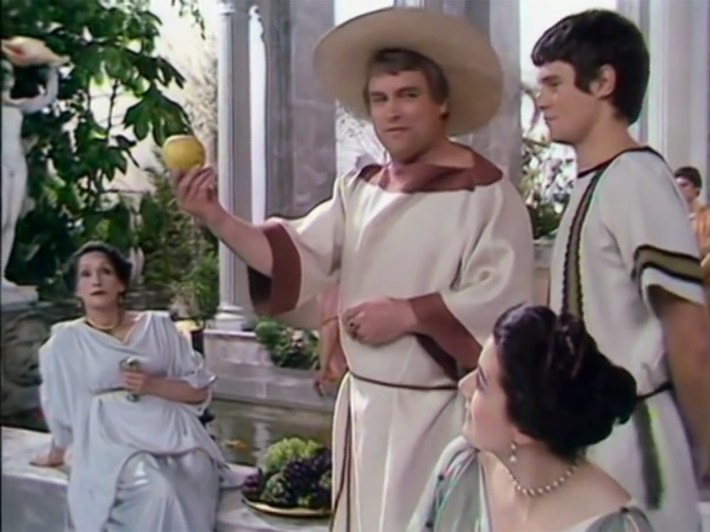
Everyone else, of course, is hyperaware of Caesar's might, whether or not they try to hide it. The only apparent exception, Marcus Agrippa, reveals himself to be just as much of a politicker as anyone else when he makes his play to become his old friend's son-in-law, just to improve his chances of wearing the Emperor's laurels himself one day. You can see a pain that Augustus rapidly tries to conceal with a smile when he realizes this man he thought he could depend on pulls a fast one instead.
No one, however, works Augustus more expertly than Livia. This is a matter of necessity. Livia's power flows from her proximity to Caesar, and her future power depends on having a similarly close relationship with his successor. She needs Augustus to see things her way, and she uses her formidable intelligence and ruthlessness to ensure that he does. Okay, fine, so she helps things along with, as the episode's title puts it, a touch of murder. Sometimes you've gotta take matters into your own hands!
If Blessed chews the scenery, Siân Phillips nibbles it seductively, staring off into the middle distance while contemplating somebody's downfall. Her voice a purr, her eyes two pools of blackness, her skin white as Roman statuary, her cheekbones capable of slicing diamonds, she's the embodiment of the Roman Empire's glamorous barbarity. She's the kind of monster who thrives in the might-makes-right chaos that has followed Julius Caesar's destruction of the relative justice and enlightenment of the Republic, the return of which she will stop at nothing to prevent. She's the snake slithering across Claudius' name and likeness in the opening credits, and she's as strong a TV villain as anyone this side of her Sopranos namesake.
What excites me the most about this first episode of I, Claudius, though, isn't Pulman's whipsmart script, Wise's fine no-frills direction, or the suite of sterling performances. It's the fact that it looks like, well, that. Even if you're watching it officially via Acorn, much less via whatever archival or tube site you manage to find it on out there on the great wide Internet, it looks like you're watching a third-generation VHS copy on a big square television wheeled out of the A/V department to your classroom on a tall metal cart.

The image quality is not great, the lighting largely functional. The sets look like sets, the makeup and wigs look like makeup and wigs, the sound effects of the roaring crowds at the Circus Maximus sound like sound effects. The camera movement is minimal, operating off a minimal number of setups per scene. Beyond the costumes, and I can't vouch for their exact period authenticity, nothing about this looks expensive.
But again, that’s not how it feels. Just as it seems heavy and heady despite its unabashed pulpiness and soapiness, it comes across expensive even though it looks cheap. You’re simply not used to seeing something that looks like this also be this goddamn good, filled with acting this simultaneously playful and nuanced, delivering dialogue that makes this late-'70s contemporary of Tom Baker's Doctor Who sound not just timeless but also, in its way, ancient. And it doesn't need to look like anything but an elaborately staged theatrical production someone pointed some cameras at to get there, either. There are so many ways to make great television drama, and this is one of them.
This recap was originally accessible to paid subscribers only, and future recaps in this series are available now for paid subscribers. If you haven't already, consider supporting worker-owned media by subscribing to Pop Heist. We are ad-free and operating outside the algorithm, so all dollars go directly to paying the staff members and writers who make articles like this one possible.
